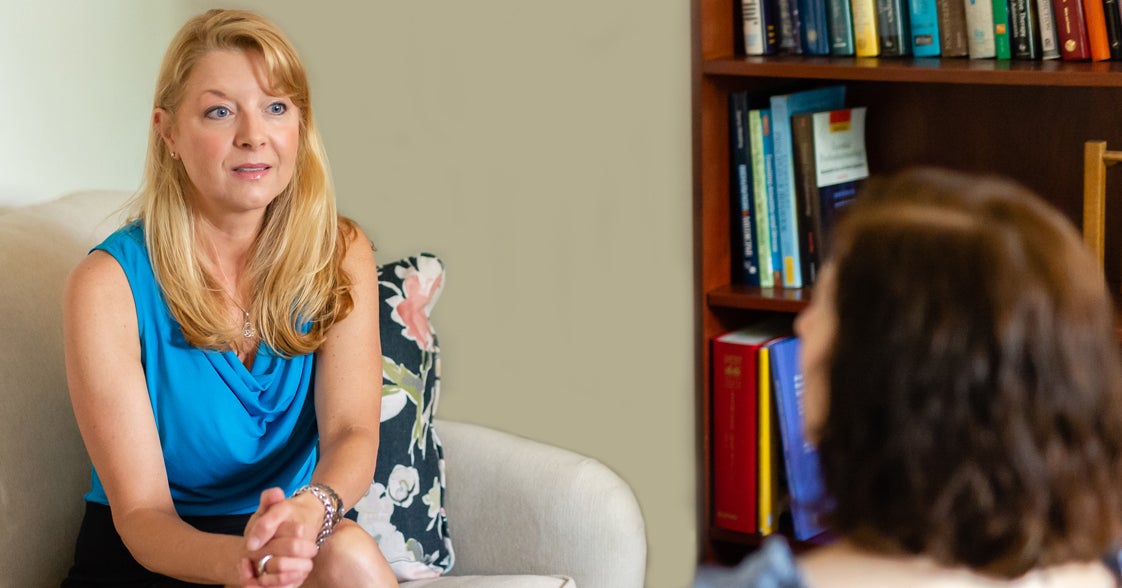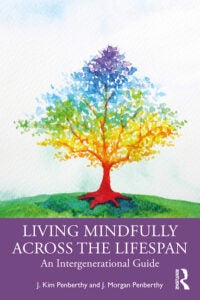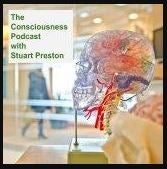Altered States of Consciousness
After-Death Communication (ADCs)
Surveys show anywhere from 30-55% of people experience at least one ADC in their lifetime. This experience consists of people receiving messages from deceased loved ones through experiences such as:

Dr. Kim Penberthy interviewing an ADC experiencer
List of ADC Examples
- memorable dreams
- significant sounds
- special smells
- feeling touches
- particular symbols
- changes in lighting/electronics
- other personal imagery
Sometimes these events are experienced in altered states, such as meditation or hypnagogic states before/after sleep, and sometimes they happen in an everyday state of consciousness. These experiences often involve everyday people who do not have a history of mediumistic abilities or special skills. When people experience these ADC events, they are often a great source of comfort and healing.
They can happen in the wake of a recent death, 1-2 years after a death, or even many years later. Occasionally, an ADC yields information not previously known to the living recipient. There is much to be studied in this area: the types of people who experience ADCs, the range of circumstances for occurrence, veridical elements, as well as short-term and long-term effects on a person’s grieving process. To share an ADC with us, please reach out to Dr. Fatma Wise.
Out-of-Body Experiences (OBEs)
Approximately 15% of the general population, at some point in their life, has had the experience of feeling located in space away from their physical body. This experience also occurs in 65% of persons who come close to death and survive.
While most OBEs are spontaneous, a small number of persons claim to be able to have these experiences voluntarily. Such persons may be suitable for experiments that might demonstrate exceptional features of these experiences.
Features of Exceptional OBEs
- Veridical Observations – Some persons report they went to another place and observed events they could not have known because they were outside the range of their normal senses.
- Shared Experiences – On rare occasions, the person who reports having been an OBE may be perceived by another person at the place where the first person claimed to be during the OBE.
If you have an experience with one of these features, or you can induce OBEs voluntarily, please Contact Us.
Psychedelics and Mystical Experiences
Scholars and mystics have long been fascinated by psychedelic substances, in part, due to their ability to drastically alter sensory perception and cognition. How these particular substances work is still being researched and understood, but their effects appear to be potent. One psychedelic substance that has demonstrated possible mental health benefits is psilocybin.
We know that psychedelics like psilocybin have shown promise in treating various conditions. We’re asking…how the subjective, often deeply meaningful experiences people have during treatment might play a role in that healing process. -Dr. Kim Penberthy
DOPS researchers Drs. Kim Penberthy and Fatma Wise are leading research of psilocybin at UVA, the first of its kind at the university. They are hoping it might provide relief for those suffering with Prolonged Grief Disorder – a condition in which persistent and intense grief symptoms interfere with a person’s ability to function in daily life. Their research focuses specifically on exploring the impact of psilocybin-induced subjective mystical experiences on clinical outcomes.
Mindfulness, Meditation, and Unusual Experiences

Kim Penberthy, PhD – Carlson Prof. of Psychiatry
Dr. Kim Penberthy and her colleagues are interested in studying meditators, especially the unusual experiences sometimes reported during (or around) meditation sessions. Research shows meditation to be hold a variety of benefits for stress-related conditions, but there has been little investigation into the reports of unusual experiences associated with a meditation or mindfulness practice.
These reports include anecdotes of precognition, telepathy, clairvoyance, synchronicity, memories of past lives, out-of-body experiences, and other unusual experiences. DOPS is particularly interested in reports where people experienced enhanced psychic or psi abilities as a result of meditation retreats, intensive practice, or meditation classes.
If you have had an unusual experience associated with your meditation and/or mindfulness practice, we would like to hear about it. Please feel free to share your experience with our research team: Contact Us.
BOOKS
 Living Mindfully Across the Lifespan: An Intergenerational Guide
Living Mindfully Across the Lifespan: An Intergenerational Guide
by J. Kim Penberthy and J. Morgan Penberthy
This book provides user-friendly, empirically supported information about using consciousness modalities such as meditation and mindfulness to address issues in daily life.
In the last chapter of the book, Penberthy discusses evidence and experiences that support concepts of consciousness existing beyond the confines of the physical body.
In addition, review a list of recommended books by other authors pertaining to the topics of out-of-body experiences, after-death communications, and other altered states.
RESEARCH
Click here to view academic publications by our faculty on altered states of consciousness
Podcast: Profoundly Pointless (Cloud10 and iHeartPodcasts)
“Afterlife Researcher Dr. J. Kim Penberthy”
What happens after we die? Psychologist Dr. J. Kim Penberthy studies near-death experiences and after-death communications. We talk about afterlife experiences, the psychology of death, and the latest science on what’s next.
 The Consciousness Podcast
The Consciousness Podcast
Episode 7: Survival of Consciousness after Death with Dr. Edward Kelly
Dr. Edward Kelly is a UVA Division of Perceptual Studies researcher and the author/editor of two significant academic books addressing issues related to the nature of human consciousness- Irreducible Mind published in 2007 and Beyond Physicalism published in 2015.
Podcast: Spirit Matters
Episode: Psychic Phenomena and How it Relates to Spiritual Development with Dr. Edward Kelly
Author of Beyond Physicalism and Irreducible Mind, Dr. Edward Kelly is interviewed in this podcast by Phil Goldberg, author of American Veda, and Dennis Raimondi. The interviewers ask Dr. Kelly about his and others’ research on psychic phenomena and how it relates to spiritual development.
Kim Penberthy: After-Death Communications, End-of-Life Psychology, Mindfulness, & more
U of Michigan, PROGRAM in CREATIVITY and CONSCIOUSNESS STUDIES: “New Frontiers in Consciousness Research”, presented by Kim Penberthy
Scientific and Medical Network: Kim Penberthy, PhD – “Introduction to the Study of the Mind-Body Relationship”
Consciousness Unbound: An In-Depth Interview with Ed Kelly (Thanatos TV)
Emily W. Kelly: Mediumship and Survival-Parapsychology Foundation Mediumship Conference
W.J. Ross Dunseath: Physiological Correlates of Psi Phenomena Pilot Study of EEG and Psychokinesis
Ed Kelly: Consciousness is More than a Product of Brain Activity
Kim Penberthy presents her research on Meditation and Altered States of Consciousness
John Cleese & Ed Kelly discuss survival of consciousness


